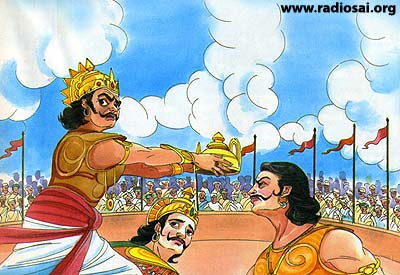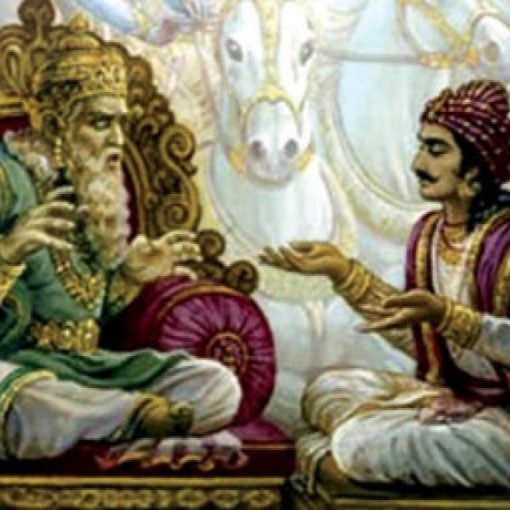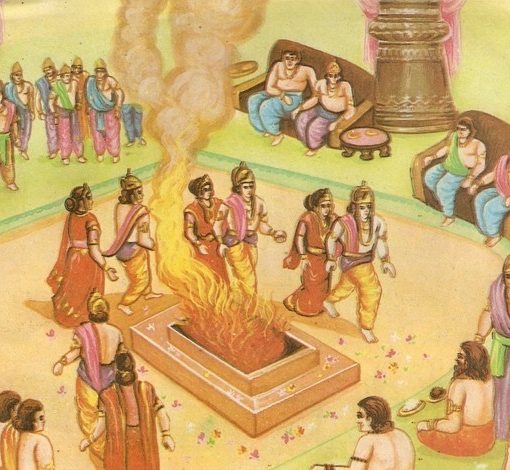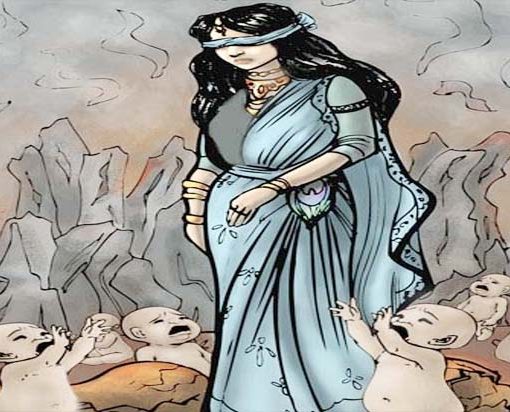One day Bhīṣma approached Vidura and said, “O wise one, we should take steps to ensure that our noble line does not again face extinction. The two princes are ready for marriage. I have heard that there are three princesses worthy of being allied to our house. Tell me your thoughts on this, O Vidura.”
Bhīṣma said that there was a princess in the Yadu house named Kuntī, another named Gāndhārī, who was a daughter of the mountain king Suvala, and a third princess named Mādrī, in Madra. He suggested that two of these girls could be sought for Pāṇḍu and the other for Dhṛtarāṣṭra.
Vidura folded his hands and replied, “My lord, you are our father, our protector and our preceptor. You should do whatever you feel is proper for the welfare of our dynasty.”
Bhīṣma paced up and down his palace chamber. He had heard that Gāndhārī had received a boon from Śiva, who had said she would have one hundred sons. Surely she would make a good wife for Dhṛtarāṣṭra, who had also been blessed in a similar way by Vyāsadeva. A hundred sons from that powerful prince would be a great asset to the kingdom and would ensure the perpetuation of the Kuru dynasty. Bhīṣma at once arranged for messengers to go to Suvala and ask for the hand of Gāndhārī.
When King Suvala heard Bhīṣma’s request, he was hesitant. How could his daughter marry a blind prince? But Suvala reflected on the possibility. Dhṛtarāṣṭra belonged to the glorious Kuru house. They had ruled the world for thousands of years. Considering the fame, nobility and virtue of the Kurus, Suvala assented to the marriage. He had his son Śakuni bring Gāndhārī to Hastināpura. When the princess heard that she was to marry the blind Dhṛtarāṣṭra, she took a cloth and bound her own eyes, not wanting to be in any way superior to her lord.
Śakuni gave away his beautiful sister to Dhṛtarāṣṭra along with many gifts sent by Suvala. After being duly respected by Bhīṣma, he then mounted his golden chariot and returned to his kingdom. Gāndhārī became immediately devoted to her husband. She pleased him in every way by her attentions, she never even referred to other men in her speech, and her eyes were always covered by the cloth.
With Dhṛtarāṣṭra married, Bhīṣma turned his mind to Pāṇḍu’s marriage. He had heard that the princess Kuntī would soon select a husband at a special ceremony known as a svayaṁvara. That princess was famous for her beauty and womanly qualifications, and she belonged to the noble Yadu race. Bhīṣma told Pāṇḍu to leave at once for the svayaṁvara and try to win Kuntī’s hand.
The king mounted a great dark stallion and rode swiftly to the southern kingdom of Kuntībhoja, the father of Kuntī. Like a proud lion, he strode into the svayaṁvara arena. When the many other kings assembled there saw Pāṇḍu, broad-chested and with eyes like a furious bull, they considered him to be a second Indra. He outshone all the other monarchs like the sun rising in the morning and obscuring the stars. When Kuntī saw the powerful Hastināpura monarch gazing at her, her mind became agitated. Trembling with emotion, she walked slowly toward him and shyly placed the nuptial garland around his neck.
Although there were many kings and princes desirous of Kuntī’s hand, and although a svayaṁvara would almost always end up in a fight, the kings abandoned any thought of competing with the mighty Pāṇḍu for the princess. Mounting upon their steeds and chariots, they simply returned the way they had come. King Kuntībhoja came down from the royal platform into the arena, his face bright with delight. There could be no better match for his daughter. The king immediately arranged for the wedding ceremony, and he presented Pāṇḍu with gifts of great wealth.
After a few days the couple left for Hastināpura, accompanied by a large retinue bearing many colorful pennants which waved in the breeze. The soldiers beat drums and blew loudly upon their conchshells as they proceeded toward Pāṇḍu’s capital. Seated with Kuntī upon a shining golden chariot and surrounded by Brahmins offering benedictions, Pāṇḍu entered Hastināpura in state.
Bhīṣma was overjoyed to see Pāṇḍu married to the gentle and beautiful princess, but he also felt that the king needed another queen. Although Gāndhārī had received the benediction that she would bear a hundred sons, Kuntī had no such boon. Bhīṣma wanted to ensure that the virtuous monarch was blessed with powerful sons. He went personally to the kingdom of Madra to seek the hand of Mādrī for Pāṇḍu. She was under her brother’s, King Śalya’s, protection.
King Śalya received with all honor Bhīṣma and his retinue of ministers, Brahmins and ṛṣis. He brought Gaṅgā’s son into his palace and offered him a seat of white ivory studded with precious gems. Then the king bathed his feet and offered him arghya. His reception completed, Bhīṣma said to King Śalya, “O King, you should know that I am here to seek a maiden. I have heard that you have an illustrious and chaste sister and I have chosen her for King Pāṇḍu. Please tell me if you approve of this arrangement.”
King Śalya replied that the Kuru house was more than worthy of being allied with his house. There was, however, an ancient custom in his family that no girl could be given in marriage unless the suitor offered a tribute.
Bhīṣma had already heard of this custom because it dated back to the great Brahmā himself. He had come prepared and thus replied to Śalya, “There is no fault in this custom as it has the approval of the self-born creator, Brahmā. Therefore, please accept the gifts I have brought in exchange for the princess.”
Bhīṣma’s men then carried in heaps of gold coins, pearls, corals and gems of various colors, and set them before Śalya. Bhīṣma also presented the king with hundreds of elephants, horses and chariots.
Śalya received all the wealth with a delighted heart. He then gave Mādrī to Bhīṣma, who then soon returned to Hastināpura and performed the wedding ceremony.
Pāṇḍu established each of his wives in their own splendid palaces and gave himself up to enjoyment with them both. He sported in the palace groves and gardens, appearing like a celestial with two beautiful consorts.





